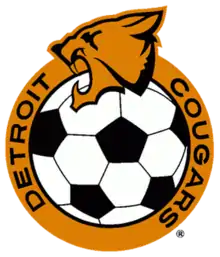Detroit Cougars (soccer)
The Detroit Cougars were a soccer team based in Detroit, Michigan, which played in the United Soccer Association and the North American Soccer League. The USA was made up of teams imported from foreign leagues. The Detroit club consisted of players from Glentoran F.C. and their player-coach John Colrain of the Irish Football League.[1][2][3]
 | |||
| Full name | Detroit Cougars | ||
|---|---|---|---|
| Founded | 1967 | ||
| Dissolved | 1968 | ||
| Ground | Tiger Stadium University of Detroit Stadium both in Detroit, Michigan | ||
| Owner | William Clay Ford, John Fetzer, others[1] | ||
| Manager | John Colrain (1967) Len Julians, Andre Nagy (1968)[1] | ||
| League | United Soccer Association (1967) North American Soccer League (1968) | ||
| 1968 | 4th (last), Lakes Division | ||
|
| |||
The Cougars were partly owned by the Detroit Lions' William Clay Ford and the Detroit Tigers' John Fetzer, and also shared the Lions' and Tigers' home field, Tiger Stadium, though when scheduling conflicts arose home games were moved to the University of Detroit Stadium.[4] One such match on June 14, 1967 against the Houston Stars ended in an infamous player riot.[5][6][3] The first-ever Cougars game in Detroit, on June 4, drew 11,629 fans to a 1-1 draw with the Vancouver Royals; over a half-century later, this remains the biggest crowd ever at a pro soccer league match in the city of Detroit.
Following the 1967 season, the USA merged with the National Professional Soccer League to form the North American Soccer League; the Irish players did not return, and the Cougars' second season was even worse than the first. After winning just nine of 43 games played in two years, the team folded immediately after the 1968 season.[1][7] After the minor American Soccer League's Detroit Mustangs played two seasons in the Motor City in 1972-73, the NASL would return to Detroit in 1978 in the form of the Detroit Express.
For the 50th anniversary of Glentoran's arrival in Detroit, local semi-pro side Detroit City FC announced that it would host Glentoran at Keyworth Stadium for an international friendly; City beat the Irish visitors, 1-0.[8][9]
Year-by-year
| Year | League | W | L | T | Pts | Regular Season | Playoffs |
|---|---|---|---|---|---|---|---|
| 1967 | USA | 3 | 3 | 6 | 12 | 4th, Eastern Division | Did not qualify |
| 1968 | NASL | 6 | 21 | 4 | 88 | 4th, Lakes Division | Did not qualify |
References
- Crossley, Andy (21 August 2014). "1967-1968 Detroit Cougars". Fun While It Lasted. Retrieved 5 July 2017.
- Thomson, Ian (23 May 2013). "Glentoran Says "Goodbye Belfast, Hello Detroit"". The Soccer Observer. Retrieved 5 July 2017.
- Rowbotham, Simon (16 Feb 2014). "Summer with the Cougars". In Bed With Maradona. Retrieved 5 July 2017.
- "NASL Book". Baltimore Afro-American. 20 April 1968. p. 15. Retrieved 5 July 2017.
Although Tiger Stadium is the Cougars' new home this year, they will play their lidlifter at University of Detroit Stadium
- "Soccer Players Riot". The Evening Independent. St Petersburg, FL. 15 June 1967. p. 19-A. Retrieved 5 July 2017.
- Thomson, Ian (14 June 2013). "The Infamous 1967 Detroit Riot… On The Soccer Field". The Soccer Observer. Archived from the original on 14 March 2014. Retrieved 5 July 2017.
- Litterer, David (15 July 2012). "North American Soccer League (1967-1984): Team Standings and Playoff Results". American Soccer History Archives. Retrieved 5 July 2017.
- "Detroit City FC announces 2017 schedule". Detroit News (6 Feb 2017). Retrieved 5 July 2017.
Detroit City FC will play 11 matches at Keyworth Stadium this season, including four friendlies — highlighted by its international encounter with Northern Ireland's Glentoran May 27 to commemorate the 50th anniversary of the Detroit Cougars.
- Biglin, Kevin (27 May 2017). "Tyler Moorman's late goal gives DCFC a 1-0 win over Glentoran FC". Detroit City FC. Retrieved 5 July 2017.
Detroit City FC won their international friendly Saturday against Glentoran FC, 1-0, on a night honoring the 50th anniversary of the Detroit Cougars at Keyworth Stadium.
- Duly, Jeffrey. "Detroit Cougars (1967-1968)". Archived from the original on 30 September 2015. Retrieved 5 July 2017.